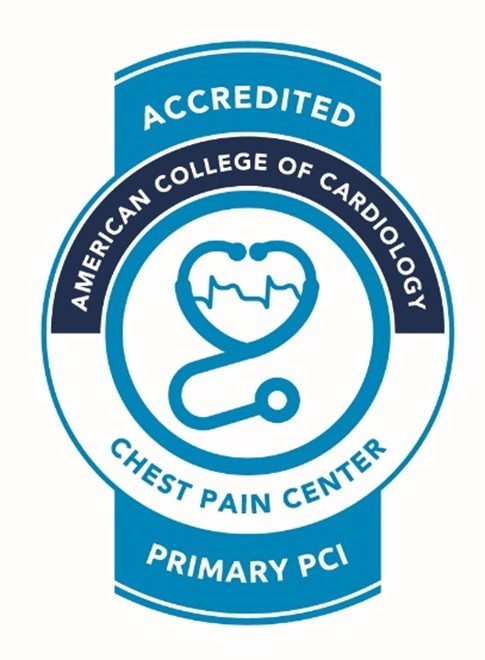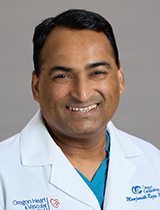PeaceHealth hospital in Springfield, Ore., earns national re-accreditation for care of patients experiencing heart attack
| News | Heart Health | Service Line

SPRINGFIELD, Ore. – PeaceHealth Sacred Heart Medical Center at RiverBend has earned re-accreditation as a Chest Pain Center from the American College of Cardiology (ACC). It is among three hospitals in Oregon to receive this certification.
Accreditation ensures that RiverBend is held to the highest standards of care for all patients experiencing chest pain, from those at low or moderate risk to those having a heart attack. This includes required processes at every step along the way, from the start of symptoms, EMS response, hospital care and follow-up after the patient returns home.
“This re-accreditation shows our heart team’s commitment to caring for our patients and continually improving our processes,” said Dr. Manjunath Raju, medical director of RiverBend’s Chest Pain Center. “It means when you arrive at RiverBend with heart attack symptoms you can expect state-of-the-art care, with quick identification of your condition and treatment starting within minutes. It is a commitment to the best practices available and collaboration with other departments in the hospital and with our community partners to provide the best care possible.”
Following a rigorous onsite review, the ACC team highlighted these strengths of RiverBend’s Chest Pain Center:
- Significant outreach work and continued enhancement of relationships with Emergency Medical Services (EMS) partners
- Notable community outreach to raise knowledge of heart attack symptoms and hands-only CPR
- Collaboration with Eugene Springfield Fire to train over 2,000 community members to perform hands-only CPR
- Partnership between the PeaceHealth Sacred Heart Medical Center Foundation and the Eugene Police Foundation to equip 48 Eugene Police patrol cars with AEDs
- Improvement in recognizing heart attack among patients admitted to the hospital for other reasons
RiverBend’s accreditation includes the “Primary PCI” distinction, which means the hospital can provide percutaneous coronary intervention, also known as coronary angioplasty or “stenting”, around the clock, 365 days year. PCI is a nonsurgical procedure that opens narrowed or blocked coronary arteries with a balloon to relieve symptoms of heart disease, reduce heart damage and improve the patient’s quality of life.
Every year about 805,000 people in the United States have a heart attack, according to the Centers for Disease Control and Prevention. The most common symptom of heart attack for both men and women is chest pain or discomfort. People also may experience tingling or discomfort in one or both arms, back, shoulder, neck or jaw. Other symptoms include shortness of breath, a cold sweat, unusual fatigue, a heartburn-like feeling, nausea or vomiting, sudden dizziness or fainting. Women are more likely than men to experience these other symptoms, like fatigue or vomiting.
If you notice heart attack symptoms in yourself or someone else, call 911 immediately.
More information about PeaceHealth’s heart and vascular services is available at www.peacehealth.org/heart.
About PeaceHealth: PeaceHealth, based in Vancouver, Wash., is a not-for-profit Catholic health system offering care to communities in Washington, Oregon and Alaska. PeaceHealth has approximately 16,000 caregivers, a group practice with more than 1,200 providers and 10 medical centers serving both urban and rural communities throughout the Northwest. In 1890, the Sisters of St. Joseph of Peace founded what has become PeaceHealth. The Sisters shared expertise and transferred wisdom from one medical center to another, always finding the best way to serve the unmet need for healthcare in their communities. Today, PeaceHealth is the legacy of the founding Sisters and continues with a spirit of respect, stewardship, collaboration and social justice in fulfilling its Mission. Visit us online at peacehealth.org.






